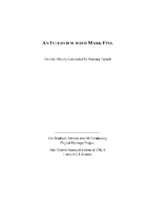Search the Special Collections and Archives Portal
Search Results
Audio recording clip of interview with Faye Duncan Daniel by Claytee D. White, October 18, 1996
Date
Archival Collection
Description
Part of an interview with Faye Duncan Daniel by Claytee White on October 18, 1996. Daniel discusses the Displaced Homemaker Program and Help Centers of Southern Nevada, which resulted in Women of Achievement.
Sound

Transcript of interview with Otto Merida by Claytee White, May 18, 2017
Date
Archival Collection
Description
When looking back on his legacy in the Latinx community of Las Vegas, Otto Merida (1945 - ) takes great pride in being a Latin Chamber of Commerce [LCC] co-founder with Arturo Cambeiro. With the LCC, they forged a powerful economic entity that continues to provide the local Latino community with social and political influence. Growing up during the 1950s in Havana, Otto Merida fondly remembers his childhood despite living under the dictatorship of Fulgencio Batista. There were the murmuring sounds of explosions from afar on the way to baseball games, but also the warm Sunday family meals of Cuban soup with fideos. In this interview, he talks about the rising communist powers inspired by revolutionary Fidel Castro and the events that led his family to place him in the Peter Pan Program in 1961. The Peter Pan Program sent unaccompanied Cuban children to the United States to avoid potential instruction by Castro’s government. Merida still holds on to his mother’s final request upon leaving Cuba-“I want you to remember the address where we live and the phone number: Josefina 68-entre primera y segunda-La Víbora, Havana con el teléfono X4304.” As a part of the Peter Pan Program, Merida experienced a nomadic childhood living in barracks in Miami and a three-story home in Wilmington, DE. The only connection he had to his family were a series of letters he exchanged with his mother, until they reunited years later in Miami. For Merida, life on 79th Street and Biscayne Boulevard in Miami was defined by the values of his family and other Cubans and African Americans in his neighborhood. v Merida earned his bachelor’s degree in Political Science from the University of Florida. He credits his sister-in-law with a pivotal role in his decision to pursue a higher education. His engagement in politics continued through his involvement with the Cuban Circle, the first Hispanic community to be involved with politics in Las Vegas. He describes the migration of Cubans to the casino scene of Las Vegas and the presence of Cubans in the community. His work with the Cuban Circle inspired him to develop a political presence for Hispanics in the community. While travelling across the United States before settling in Las Vegas, Merida made many significant relationships while working with associations such as the Fitchburg Chamber of Commerce and Volunteers in Service to America [VISTA]. Living in Las Vegas, Otto Merida worked as an educator and community organizer. In the late 1970s, Merida and Arturo Cambeiro collaborated to create the Latin Chamber of Commerce of Las Vegas. For Merida, the Chamber consistently goes above and beyond the vision he and Cambeiro had created when they first opened their doors. From the creation of the Latino Youth Leadership Program at UNLV to their work alongside political figures such as Senator Catherine Cortez-Masto, Merida is extremely proud of the various accomplishments of the Chamber. Now as President Emeritus, Otto Merida continues to dedicate himself to the Chamber as a volunteer and serves as one of the many Latinx Voices of Southern Nevada that have shaped the greater Las Vegas community.
Text

Transcript of interview with Rabbi Mendy Harlig by Barbara Tabach, October 18, 2017
Date
Archival Collection
Description
Known throughout the Las Vegas community as Rabbi Mendy, Mendy Harlig is a leader of the Chabad in Las Vegas, which was introduced to the valley in 1990 by his brother Rabbi Shea Harlig. Since his youth spent growing up in the Crown Heights section of Brooklyn, where he was surrounded by Hasidic Jews, Rabbi Mendy seemed destined to become a Chabad rabbi. During the early 1990s he often visited Las Vegas and assisted his brother at the Chabad of Southern Nevada. Then in 1997 he met and married Chaya Harlig and the couple permanently relocated to the valley to be the spiritual leaders of the Chabad of Green Valley. As their family grew, so did their importance to the Chabad movement in Las Vegas. During this interview, Rabbi Mendy touches upon the nature of Chabad teachings and observance in the so-called “Sin City” persona of Las Vegas. He also shares about his participation in the Las Vegas Metro Chaplaincy program. He particularly reflective of his active role immediately after of the horror of the October 1 mass casualty at the Route 91 country music festival and his perspectives afterwards.
Text
#66893: UNLV Career Day Interviews at Thomas and Mack Center, 2009 February 27
Level of Description
Archival Collection
Pagination
- Previous page ‹‹
- Page 5
Archival Component
"On the Record" and "Newsmakers" interviews with Bob Stupak: video, 1990 February 18
Level of Description
Scope and Contents
Channel 8 "On the Record" interview with Bob Stupak; he shares his background and first coming to Las Vegas; developing and promoting his Vegas World casino; relationship with press and media; Superbowl $1 million dollar bet; challenging Donald Trump; developing the concept for the Stratosphere Tower; Tower height controversy; experience owning and running the Las Vegas Bullet newspaper; personal heros; predictions for the future of Las Vegas; Second half is Channel 13 "Newsmakers" interview with Bob Stupak discuss Stratosphere design; predictions for success of the tower; aviation/tower height controversy. Original media VHS, color, aspect ratio 4 x 3, frame size 720 x 486.
Archival Collection
Pagination
- Previous page ‹‹
- Page 5
Archival Component
#68437: Students around campus on the first day of classes of the spring semester on January 18, 2012, 2012 January 18
Level of Description
Archival Collection
Pagination
- Previous page ‹‹
- Page 5
Archival Component

Transcript of interview with Patricia Mulroy by Claytee White, November 18, 2013
Date
Archival Collection
Description
Patricia Mulroy served Las Vegas as the general manager of the Las Vegas Valley Water District from 1989 to 2014. She served the state of Nevada as the general manager of the Southern Nevada Water Authority from 1993 to 2014. Patricia helped to build the Authority, and saw the state through the devastating drought of the Colorado River. Patricia was born in Frankfurt, Germany on February 24, 1953. As a young girl, she lived in several different countries, but always felt that the United States was her home. Her experiences abroad led her to develop a fascination with government work and state service. She arrived in Nevada in 1974 to attend UNLV. In 1989, Patricia became the general manager of the Las Vegas Valley Water District. She entered the field at a tumultuous time, facing the drought of the Colorado River and tension within the districts. She pioneered the Water Authority, which revolutionized southern Nevada’s water rights system and allowed the districts to deal with the is
Text
Philip E. Joyal oral history interview summary, 2006 July 18
Level of Description
Archival Collection
Pagination
- Previous page ‹‹
- Page 5
Archival Component

Transcript of interview with Mark Fine by Barbara Tabach, November 18 and December 2, 2014
Date
Archival Collection
Description
Interview with Mark Fine in two sessions, November 18 and December 2, 2014. In the first session, Fine begins by talking about his sons and their business interests, then discusses his own childhood growing up in Cleveland. Fine moved to Arizona as a teenager and attended the University of Arizona for college. After college, he moved to New York city, and describes his employment at Chemical Bank, and then at the investment firm Loeb, Rhoades. He was married and started a family in New York City, then moved to Las Vegas to assist in his in-laws' (the Greenspuns) business ventures, which included real estate development and Sun Outdoor Advertising. Fine talks about Las Vegas in the 1970s and building Green Valley and Summerlin, the "social engineering" aspects of developing a community and the importance of building incrementally. In Part II of the interview, Fine discusses his family history and raising his children in Las Vegas. He talks about the growth of the Jewish community and ph
Mark Fine was born in 1946 in Cleveland, Ohio, and was raised with a strong Jewish identity. When Mark was in fourth grade, his parents moved the family to Shaker Heights, and again moved to Arizona during his senior of high school. Upon graduation, Mark enrolled at the University of Arizona and became a member of the ZBT fraternity; determined to graduate in four years, he finished in 1964 with a degree in business administration with an emphasis in real estate. Though never having been, Mark took his degree to New York City and established a career on Wall Street, first working for Chemical Bank. In 1969, Mark married Susan Greenspun, and soon after, the couple had their first child. By this time, Mark had taken a new position with Loeb, Rhoades and Company, and worked there for nearly five years in their corporate finance department. In 1973, Mark moved to Las Vegas to assist his father-in-law, Hank Greenpun, with his nonnewspaper business operations, largely under the auspices of American Nevada Corporation. Mark soon capitalized on this passion for real estate and community development, leading several integrated real estate projects to create the Green Valley area, the city's first large-scale master-planned community. Mark went on to launch a similar project in Summerlin, and at one point, he was leading the development of the country's two fastest selling planned communities (Green Valley and Summerlin). Ultimately, Mark became one of state's prominent real estate developers, and continues to lead significant projects positively impacting the city's growth and appeal. His fundamental goal has always been to create a sense of place, to develop thriving communities with generational stamina. His success in this endeavor is recognized, in part, with the naming of Mark L. Fine Elementary School. Over the years, Mark has also been an important member of the Jewish community, among the "second generation of pioneers," coming after those heavily involved with the hotels during the 1950s and 1960s. He served on the Temple Beth Sholom board of directors, and initiated events to bring older and younger generations of the Jewish community together in meaningful ways. Mark has five children?Alyson Marmur, Katie Erhman, Jeffrey Fine and Jonathan Fine and Nicole Ruvo Falcone?and is married to Gloria Fine.
Text
Day by Day, undated
Level of Description
Archival Collection
Pagination
- Previous page ‹‹
- Page 5
Archival Component
